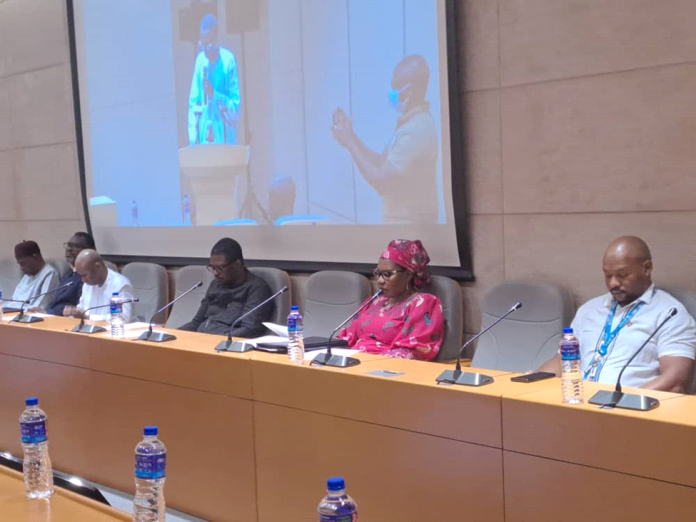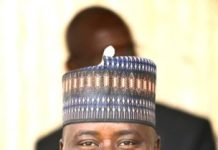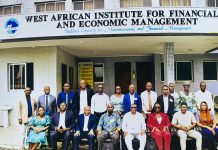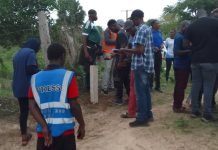By: Kebba AF Touray
The Government of the Gambia, in collaboration with developing partners on Wednesday, 21 December, 2022 validated the Green Recovery-Focused National Development Plan dubbed RF-NDP 2023-2027.
Held at the Conference Centre in Bijilo, the validation aimed to have inputs of stakeholders such as the public sector in the document so that a befitting recovery focused National Development Plan is developed which will reflect the needs and aspirations of the Gambian people.
Speaking at the occasion, the Permanent Secretary, Ministry of Finance, Mr Abdoulie Jallow, said once finalised and adopted, the Green Recovery-Focused NDP (2023-2027) will address the recovery needs of the country and provide Development Partners an avenue to align their support to the country’s recovery and medium-term development needs.
He added “the Green Recovery-Focused National Development Plan will also help address the triple development challenges such as the impact of COVID-19 pandemic, climate change, and the risk of debt distress.”
The RF-NDP, he said, will serve as the vehicle for implementing the Agenda 2030 and the African Union Agenda 2063.
“The implementation of the RF-NDP requires effective and efficient coordination and collaboration between all stakeholders including the development partners. A key focus of the RF-NDP is inclusive partnerships and international development cooperation for enhanced implementation of the Plan and attainment of our national development objectives,” said PS Jallow.
Mr George Lwanda, Head of UN Resident Coordinator’s Office, said that the Paris declarations for aid effectiveness and the Accra Agenda for Action, are the two international declarations on how development assistance can be effective, which they always try to be consistent with.
These declarations, he said, called for things and among them is the national ownership, within which the validation event commensurate, and calls for host countries such as the Gambia, to set its own development priorities, which is done through the NDP, which sets out how government is going to apportion the scarce resources.
Secretary General and Head of the Civil Service, Salimatta Touray, said that the plan reflects the key policy priorities of the Government and in line with the principle of “leaving no one behind”. As the formulation process of the RF-NDP was highly participatory, the strategic objectives of the draft document are a culmination of various consultative processes and the output of the Sector Working Groups (SWGs).
This national validation workshop aims to build upon these consultations and provides a platform for stakeholders to provide further inputs into the draft document prior to the presentation and adoption by cabinet.
“Your role here today is to critically review the draft with a view to further enriching the document to reflect the needs and aspirations of the Gambians, and thus encourage all stakeholders to adequately scrutinise this draft document and provide value input,” she told the participants.
She elaborated that it is also important for participants to optimally utilize the breakout sessions to address any key pending gaps in the document, stressing that ssuccessful implementation of the RF-NDP requires strong institutional and human capacity at all levels.
She pointed out that the role of the civil service and the public sector in the effective implementation of the plan cannot be overemphasised, adding that the public sector is the steel frame for reforms and improved service delivery for the attainment of our national development objectives.
While assuring that the Government will also invest in putting in place a robust results management system that will underpin the plan, she recognised the roles of the Permanent Secretaries and Heads of Department and Agencies as cardinal in the attainment of the key objectives of the RF-NDP, saying “The Plan when finalised should be your reference document that will guide you in resource allocation, utilisation and leading your institutions.”
Trade Minister, Mr Baboucarr Joof, said that the initiative to formulate a successor 2018-2021 NDP, demonstrates renewed commitment to implementation of programs and projects that will contribute to transforming the Gambia to a more progressive, vibrant and inclusive society.
“The RFNDP will build on the gains registered by the previous NDP and incorporate the lessons learned during the implementation. Its formulation comes at a time when nations are still reeling from the impact of COVID-19 Pandemic and the effects of the geopolitical crises around the world including the ongoing Russia-Ukraine war,” he said.
As a medium-term development plan, he said the RFNDP, will help address these and other development challenges being encountered with a view to achieving development aspirations of the citizenry, stating the plan is the vehicle through which they, as the government, define the requisite strategies, to address the previous prevailing socio-economic development challenges, taking into account the country’s past and present circumstances.
“The successful implementation of the RFNDP will ensure achievement of the country’s medium term development objectives and by extension contribute to the realisation of our global and regional commitments such as the sustainable development goals, and the Africa Union Agenda 2063,” said Minister Joof.





















